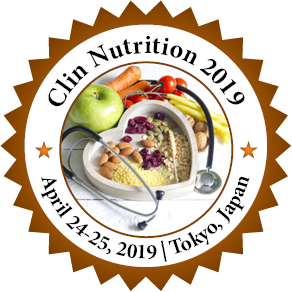Olaitan Oluwasiji Olabisi
Wesley University, Nigeria
Title: Overweight and stress- predictors of hypertension among health workers in university teaching hospital, jos, plateau state, nigeria
Biography
Biography: Olaitan Oluwasiji Olabisi
Abstract
Hypertension is a public health concern and healthcare providers are not exempted from its menace due to poor nutritional status and lifestyles. Th is study assessed blood pressure patterns, nutritional status and stress of workers in University Teaching Hospital, Jos, Nigeria. It was a descriptive cross-sectional including 283 randomly selected workers whose sociodemographic, medical and lifestyle characteristics was investigated by a semi-structured, self-administered questionnaire. Stress was assessed by International Stress Management Association (ISMA) questionnaire consisting of 20 points scale and being classifi ed into; low stress (≤4 points), moderate stress (5-13points), and high stress (14-20points). Weight and heights were measured by bathroom scale and stadiometer respectively. Waist and hip circumferences were measured by non-stretchable measuring tape. Obesity was defi ned by Body mass index (BMI), Waist –Hip Ratio (WHR) and Waist Circumference (WC), Waist-Height ratio (WHtR) and bioelectrical impedance analysis. Blood pressure was measured using digital sphygmomanometer and hypertension was defi ned as ≥140/90mmHg. Data were analyzed by Statistical Package for Social Science (SPSS) version 20.0. Descriptive statistics and association of the variables were determined. Statistical signifi cance was set at p<0.05. Proportion of male and female health workers was 32% and 68% respectively. Th eir mean age was 36.72 ±9.47years. More than half (64.3%) were within 30-49 years. Not less than 56.2% had family history of chronic diseases. Only 21.6% drank alcohol, 2.5% smoke cigarette and 65% did not engage in physical exercise. More than one quarter (39.1%) consumed fruit regularly. Prevalence of overweight/obesity was determined by BMI, WC, WHR, BIA and WHtR to be 48.9%, 31.1%, 43.1%, 65% and 71.4% respectively. Prevalence of hypertension was 30.1%. More than half (62.5%) of the respondents were moderately stressed and 7.4% highly stressed. Signifi cant diff erence exists in age, nature of work and marital status across the gender (p<0.05). Th ere was a signifi cant association between nutritional status of the respondents and their blood pressure (p<0.05). No signifi cant association was found between respondents’ stress status and blood pressure (p>0.05). Overweight, obesity, moderate stress and high blood pressure were prevalent among the health workers, and obesity was the predictor of hypertension among them. Healthcare providers need regular screening, nutrition education, engage in physical activity and have appropriate workload to maintain good nutrition and health status.

